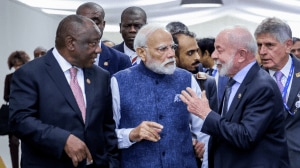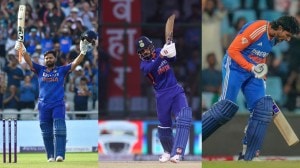Parliament interrupted: 12 years, 10 sessions & 140 suspensions
First instance of Parliament disruption occurred in 1963 and the worst session in terms of productivity for both Houses was the 2010 Winter session.
 According to PRS Legislative Research data, the Monsoon session in 2021 was the third least productive Lok Sabha session of the last two decades. (Express Photo by Amit Mehra)
According to PRS Legislative Research data, the Monsoon session in 2021 was the third least productive Lok Sabha session of the last two decades. (Express Photo by Amit Mehra)The suspension of four Congress MPs from the Lok Sabha on Monday brought back the spotlight on how Parliament frequently comes to a standstill over a deadlock between an Opposition demanding a discussion on issues it deems crucial and the government’s refusal to cede ground.
Such run-ins hamper Parliament’s productivity. According to PRS Legislative Research data, the Monsoon session in 2021 was the third least productive Lok Sabha session of the last two decades, with productivity of just 21 per cent, while the Rajya Sabha logged productivity of 29 per cent, its eighth least productive Session since 1999. At the time, Lok Sabha Speaker Om Birla and Rajya Sabha Chairman M Venkaiah Naidu expressed anguish over the disruptions, with Naidu even breaking down while speaking about the conduct of MPs.
As things stand now, this year’s Monsoon session is faring worse. The Lok Sabha, as of July 22, has productivity of 15 per cent and the Rajya Sabha 23 per cent, as per PRS data. According to PRS Legislative Research records since 1999, the worst session in terms of productivity for both Houses was the Winter session of 2010. The BJP was in Opposition then, and the party allowed no business to be transacted, demanding a Joint Parliamentary Committee (JPC) probe into the 2G spectrum licence allocation in the wake of the CAG’s report. The productivity of Rajya Sabha in that session plunged to a mere two per cent; Lok Sabha did marginally better at 6 per cent, according to PRS data.
 Four Congress Lok Sabha MPs including Manickam Tagore, Ramya Haridas, Jothimani and TN Prathapan suspended for the entire Monsoon session. (ANI)
Four Congress Lok Sabha MPs including Manickam Tagore, Ramya Haridas, Jothimani and TN Prathapan suspended for the entire Monsoon session. (ANI)
“The first instance of disruption in Parliament occurred in 1963 when a few Lok Sabha MPs first interrupted President Sarvapalli Radhakrishnan and walked out while he was delivering the joint address to both Houses,” PRS Legislative Research’s Head of Outreach Chakhsu Roy wrote in an explainer last year. “The Lok Sabha ended up reprimanding these MPs. In 1989, 63 MPs were suspended from the Lok Sabha on the discussion of the Thakar Commission report. In 2010, seven MPs were suspended from the Rajya Sabha for snatching the women’s reservation bill from a minister. Since then, MPs have raised slogans, used pepper spray in the House, and displayed placards.”
Here is a look at some of the major disturbances in Parliament over the years:
Winter session, 2021: A dozen Opposition MPs in the Rajya Sabha were suspended on the very first day of the winter session following a motion that the government introduced. The six MPs from the Congress, two each from the Trinamool Congress (TMC) and the Shiv Sena, and one each from the CPI and the CPI(M) were suspended for alleged unruly conduct towards the end of the Monsoon session in August when marshals were called after Opposition members stormed the Well of the House during the passage of the General Insurance Business (Nationalisation) Amendment Bill, 2021.
Monsoon session, 2021: As the session began in July, the Opposition began disrupting both Houses over the government’s unwillingness to allow discussion on the Pegasus snooping scandal, farmers’ protests, and the rise in prices, especially of auto fuels.
The session ended on a stormy note on August 18, two days ahead of schedule. On the last day, Leader of the Opposition in the Rajya Sabha Mallikarjun Kharge protested against the presence of marshals in the House, claiming that women MPs were not “safe”, TMC’s Derek O’Brien claimed that Rajya Sabha TV was censored and alleged that the government was using “gender shields” to foil MPs’ protests in the Upper House. The government responded by saying that Opposition members tried to attack table staff and the secretary-general. The session saw the suspension of six TMC MPs for a day for disorderly conduct.
Monsoon session, 2020: The passage of three contentious farm laws resulted in unsavoury scenes in September. A couple of Opposition MPs — Congress’s Rajeev Satav and Aam Aadmi Party’s Sanjay Singh — climbed atop the secretary general’s table. Eight opposition MPs — TMC’s Derek O’Brien and Dola Sen; Sanjay Singh; Congress’s Satav, Syed Nasir Hussain and Ripun Borah; and KK Ragesh and Elamaram Kareem of the CPI(M) — were then suspended “for the remaining part of the current session” on a motion brought in by the government citing “unruly behaviour”. The suspended MPs sat on a dharna in front of the Gandhi statue at Parliament, where they continued to protest overnight.
Budget session, 2020: Seven Congress MPs in the Lok Sabha — Gaurav Gogoi, TN Prathapan, Manickam Tagore, Gurjeet Singh Aujla, Benny Behanan, Rajmohan Unnithan and Adv. Dean Kuriakose — were suspended on March 5 for the rest of the session for disrupting the proceedings of the House. They were accused of snatching papers from the Speaker’s table. The uproar was over the Opposition’s demand for a discussion on riots in Delhi. The suspension order was withdrawn a week later.
Winter session, 2018: Then Speaker Sumitra Mahajan suspended 45 members from the Telugu Desam Party (TDP) and the AIADMK over two days in January 2019 fir continuously disrupting proceedings. While the AIADMK members were protesting against a proposed dam on the Cauvery river, the TDP MPs were demanding special status for Andhra Pradesh.
Monsoon session, 2018: In July, Sumitra Mahajan suspended six Congress Lok Sabha MPs for five days for “highly unbecoming” conduct that “undermined the Chair’s dignity”. The Opposition was protesting at the Well, demanding a discussion on the lynching of Dalits and Muslims by cow vigilante groups. The suspended Congress members were Gaurav Gogoi, K Suresh, Adhir Rajan Chowdhury, Ranjeet Ranjan, Sushmita Dev and MK Raghavan.
Winter session (extended), 2013: One of the worst unruly scenes the Parliament witnessed was in 2014. On February 14, all hell broke loose in the Lok Sabha when the Congress-led Union government introduced a bill to bifurcate Andhra Pradesh and carve out the state of Telangana. In an unprecedented act, then Congress MP L Rajagopal picked a glass item and swung it towards the secretary general’s table, breaking it, and triggering a ruckus. He then pulled out pepper spray and started spraying it indiscriminately. Three MPs had to be hospitalised and the events led to the suspension of 16 anti-Telangana MPs for the rest of the session.
Monsoon session, 2013: Nine Andhra MPs in the Lok Sabha — four from the TDP and five from the Congress — were suspended in September for disrupting the proceedings with their protests against the bifurcation of Andhra Pradesh. The month before, 12 MPs from Andhra Pradesh were suspended from the Lok Sabha for five days over the same issue.
Budget session, 2012: As the session resumed in April after a 22-day break, eight Congress Lok Sabha MPs from Telangana were suspended for four days for disrupting proceedings. They were demanding the creation of Telangana.
Budget session, 2010: The Rajya Sabha witnessed utter chaos when the Women’s Reservation Bill was taken up in March. Members opposed to the Bill threw copies of it and created such a ruckus that marshals had to be called in to physically evict them from the House. The chaos led to the suspension of seven MPs till the end of the session. The suspended members were Subhash Yadav (Rashtriya Janata Dal); Kamal Akhtar, Veerpal Singh Yadav, Nand Kishore Yadav, and Amir Alam Khan (all Samajwadi Party); Sabir Ali (Lok Jan Shakti Party); and Ejaz Ali (JD-U).








- 01
- 02
- 03
- 04
- 05























